


The article identifies ten essential qualities of effective GMP consultants, including:
These qualities are crucial for navigating complex regulatory environments and ensuring compliance. They enable consultants to provide informed guidance, foster collaboration, and implement proactive strategies that enhance overall GMP adherence in pharmaceutical manufacturing processes. By embodying these attributes, GMP consultants play a pivotal role in addressing the challenges faced in the industry and contribute significantly to the integrity of clinical research.
Navigating the intricate landscape of Good Manufacturing Practices (GMP) presents a formidable challenge for pharmaceutical companies, where compliance transcends mere regulatory requirement to become a cornerstone of quality assurance. Effective GMP consultants emerge as pivotal allies, possessing essential qualities that empower organizations to thrive amidst stringent regulations. But what precisely distinguishes these consultants in their capacity to drive compliance and enhance operational efficiency? This exploration delves into the ten critical traits that define successful GMP consultants, illuminating how their expertise can transform compliance from a daunting task into a strategic advantage.
bioaccess® is dedicated to accelerating GMP adherence for pharmaceutical facilities by leveraging its extensive knowledge of legal frameworks across Latin America, the Balkans, and Australia, with the support of gmp consultants.
With a proven track record of activating over 50 sites in less than 8 weeks and securing ethical approvals in just 4-6 weeks, bioaccess® significantly reduces the time to market for new pharmaceutical products.
Their end-to-end services, including parallel submissions by gmp consultants, empower companies to focus on innovation while ensuring compliance with stringent FDA, EMA, and MDR standards.
Such agility is crucial for organizations striving to effectively navigate the complexities of global regulations, particularly in the realm of clinical trials.
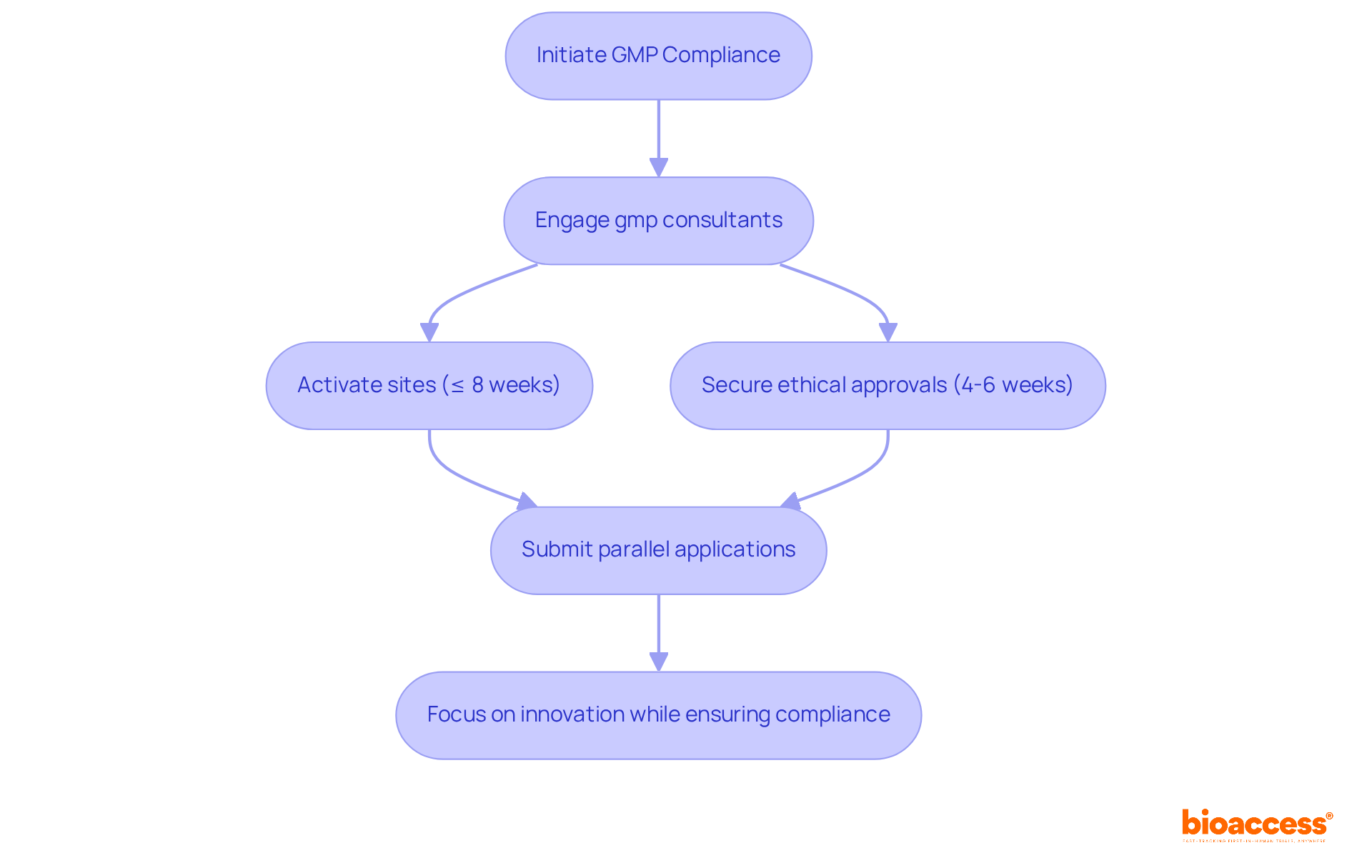
Effective GMP consultants must possess extensive industry experience, equipping them with the insights necessary to navigate the complexities of legal requirements, particularly in areas overseen by stringent authorities like INVIMA (Colombia National Food and Drug Surveillance Institute). Established in 1992 under Colombia's Ministry of Health and Social Protection, INVIMA plays a crucial role in overseeing the marketing and manufacturing of health products, ensuring adherence to health standards and best practices. Their responsibilities include monitoring medical devices through the Directorate for Medical Devices and other Technologies, which suggests technical standards for quality assurance.
GMP consultants who are knowledgeable about INVIMA's compliance framework can foresee challenges and offer customized solutions, ensuring that adherence is not merely a checkbox but a pathway to quality assurance. Specialists such as Katherine Ruiz, who focus on compliance matters for medical devices and in vitro diagnostics in Colombia, exemplify the expertise that GMP consultants bring to assist companies in navigating the complexities of GMP requirements.
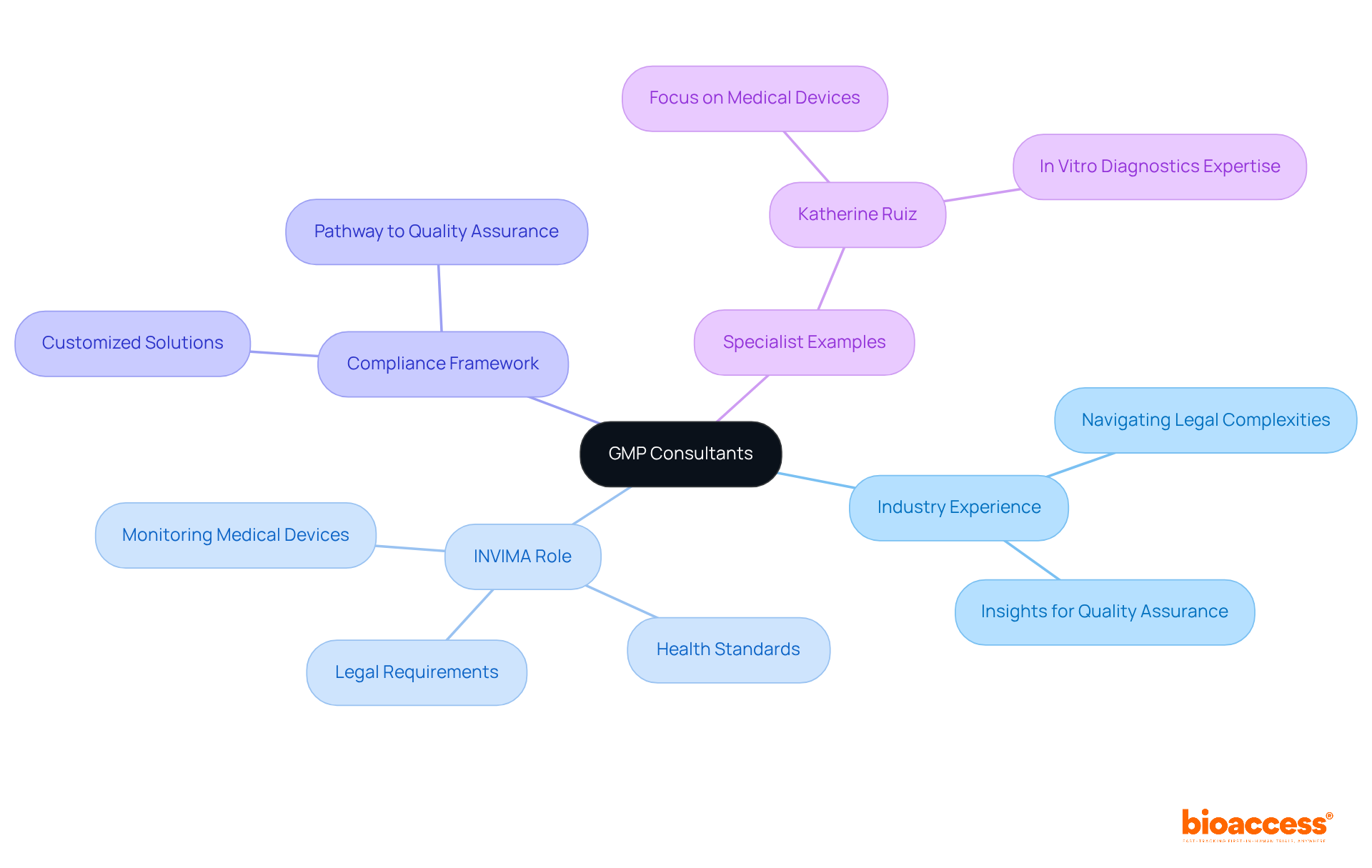
Robust communication abilities are crucial for GMP consultants, as they must clearly and effectively convey intricate compliance demands to clients and stakeholders. This encompasses not only verbal communication but also the capacity to produce comprehensive documentation that adheres to regulatory standards. By fostering open channels of communication, consultants can ensure that all parties are aligned on regulatory objectives, which is essential for successful project execution and the maintenance of GMP standards throughout the manufacturing process.
For instance, AstraZeneca saved between $10,000 and $50,000 per out-of-specification result prevented by restoring a test method to control, underscoring the financial impact of effective communication strategies. Furthermore, a Britest study demonstrated that identifying key factors affecting micronisation led to improved process understanding and enhanced project outcomes.
Regulatory specialists assert that GMP consultants who utilize robust communication tactics significantly improve adherence results, promoting teamwork and minimizing misunderstandings that could jeopardize project success. Ultimately, the importance of meticulous documentation cannot be overstated; it serves as a foundational element in GMP adherence, directly influencing the overall success of projects and the integrity of the manufacturing process.
To apply these insights, GMP experts should concentrate on:
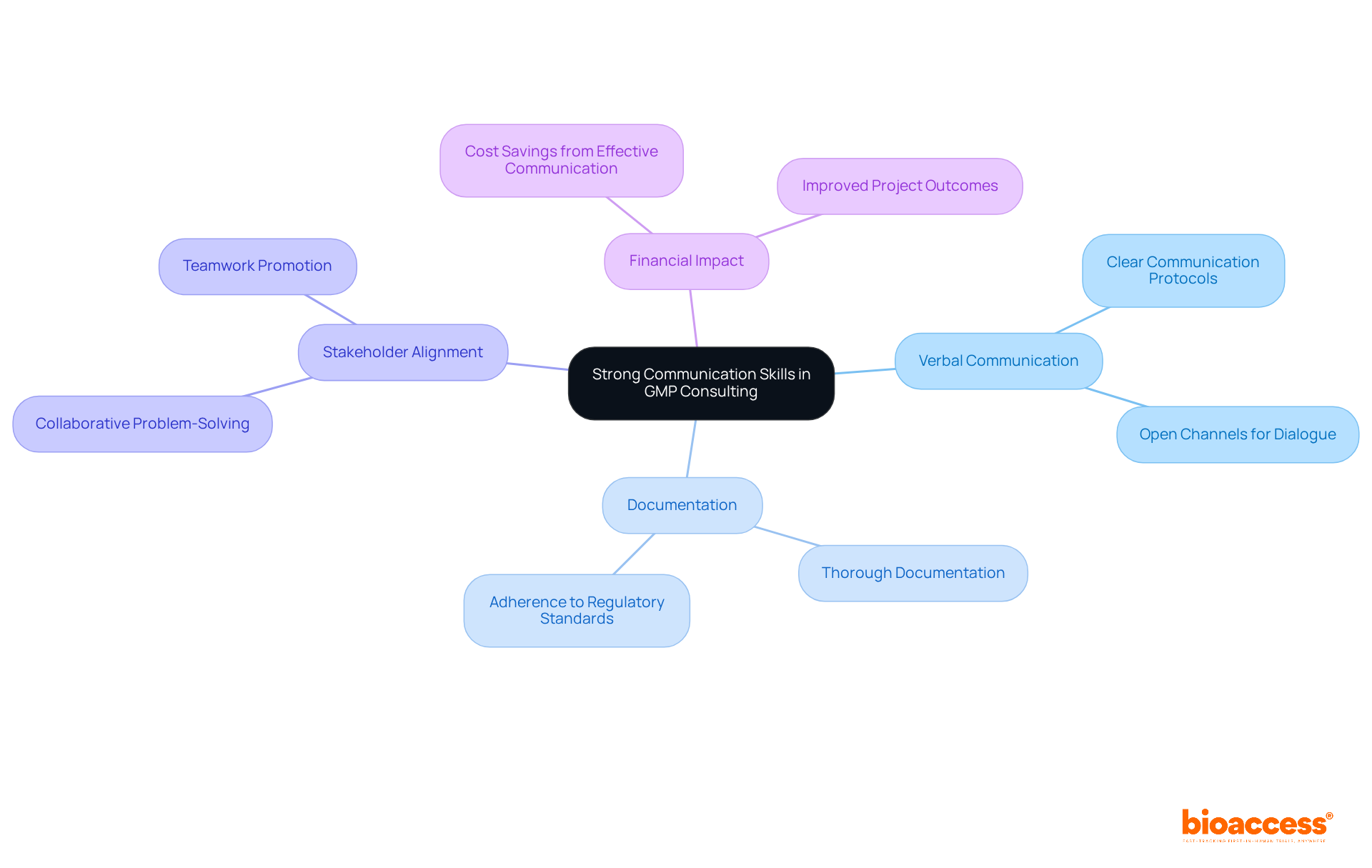
GMP advisors must possess robust problem-solving skills to effectively address the challenges encountered during regulatory efforts. This capability includes the identification of potential issues before they escalate and the swift implementation of corrective actions. A specialist's ability to assess situations, devise strategic solutions, and adapt to evolving conditions is crucial for maintaining standards and ensuring that manufacturing processes comply with legal requirements. By fostering a proactive approach to problem-solving, consultants can significantly aid organizations in navigating the complexities of GMP regulations more efficiently.
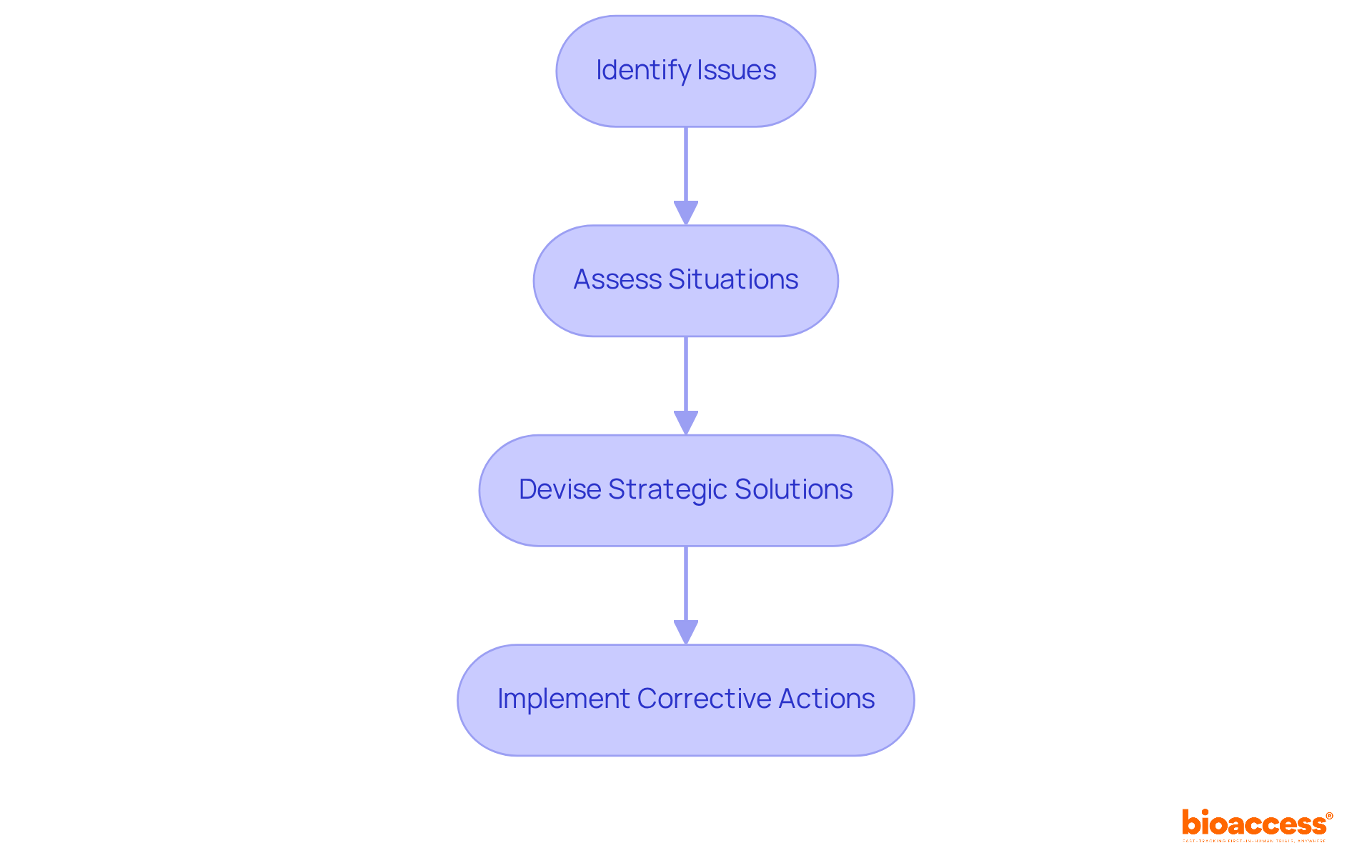
A strong comprehension of compliance requirements is essential for gmp consultants to be effective. Consultants must be skilled in the latest recommendations from oversight organizations like the FDA and EMA; this expertise enables them to provide accurate advice that guarantees adherence throughout the manufacturing process. Staying abreast of evolving regulations is crucial—72% of pharmaceutical quality professionals report challenges in keeping pace with these changes. By proactively addressing these updates, gmp consultants can assist organizations in avoiding expensive regulatory failures and maintaining high production standards.
For instance, a pharmaceutical firm that aligned its practices with the FDA-EU Mutual Recognition Agreement framework decreased inspections by 28%, showcasing the concrete advantages of compliance knowledge. Moreover, top-quartile performance achievers attain a batch right-first-time rate of 98-99%, in contrast to the industry average of 85-90%, highlighting the competitive edge acquired through careful adherence to the guidelines provided by GMP consultants.
As Scott Gottlieb, former FDA Commissioner, noted, companies that embrace quality as a competitive advantage are more likely to thrive in the industry. Professionals like Ana Criado, Director of Regulatory Affairs and CEO of Mahu Pharma, exemplify the level of expertise required in this field. With her extensive background in biomedical engineering and health economics, Ana's insights into regulatory affairs are invaluable for project managers navigating the complexities of GMP regulations.
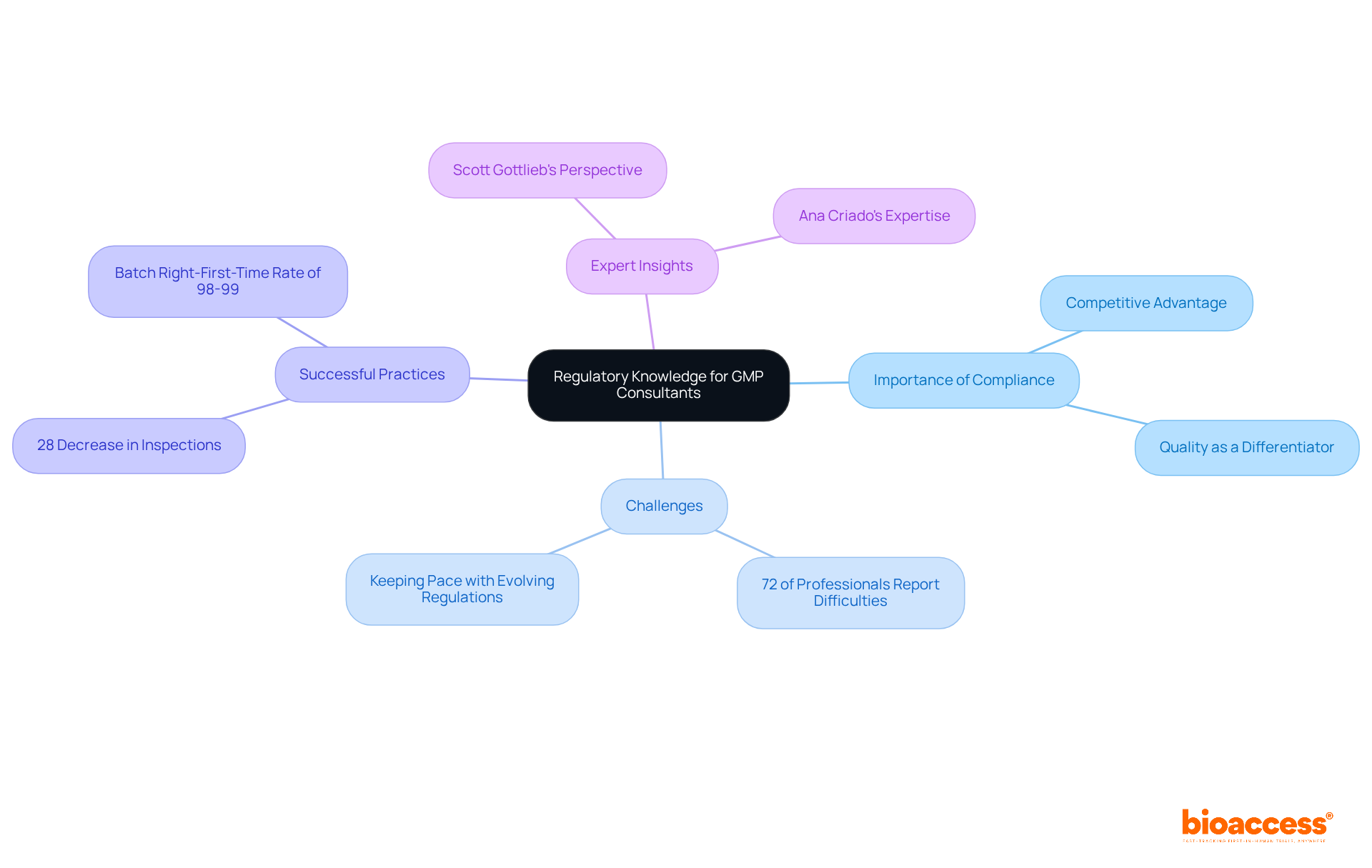
Adaptability is a cornerstone quality for GMP consultants, essential for navigating the dynamic landscape of regulations and industry standards, particularly regarding INVIMA, Colombia's National Food and Drug Surveillance Institute. INVIMA plays a crucial role in overseeing the marketing and manufacturing of health products, ensuring adherence to health standards, and providing medical approval for imports and exports. As a Level 4 health authority classified by the Pan American Health Organization/World Health Organization, INVIMA is recognized for its competence and efficiency in health regulation functions.
The ability to adjust strategies and practices in response to new guidelines from INVIMA is vital for ensuring compliance. As Dr. Priyom Bose emphasizes, "Pharmaceutical firms that facilitate swift adjustments to compliance changes will possess a competitive edge in introducing new treatments to the market more rapidly and effectively."
Consultants, particularly GMP consultants, who prioritize adaptability empower organizations to implement necessary changes swiftly, ensuring alignment with current GMP requirements set forth by INVIMA. This flexibility not only bolsters compliance but also fosters a culture of continuous improvement within the organization.
Furthermore, acknowledging the emotional impact of change on employees is critical; addressing feelings of confusion and insecurity can enhance the transition process. Industry experts assert that the ability to change faster than competitors is essential for success, establishing adaptability as a strategic advantage in the pharmaceutical sector.
To effectively leverage adaptability, organizations should promote open communication, engage employees in the change process, and provide training to equip teams with the skills necessary to manage compliance changes confidently. The expertise of professionals like Ana Criado, with her extensive background in regulatory affairs and biomedical engineering, exemplifies the importance of having informed advisors who can guide organizations through these complexities.
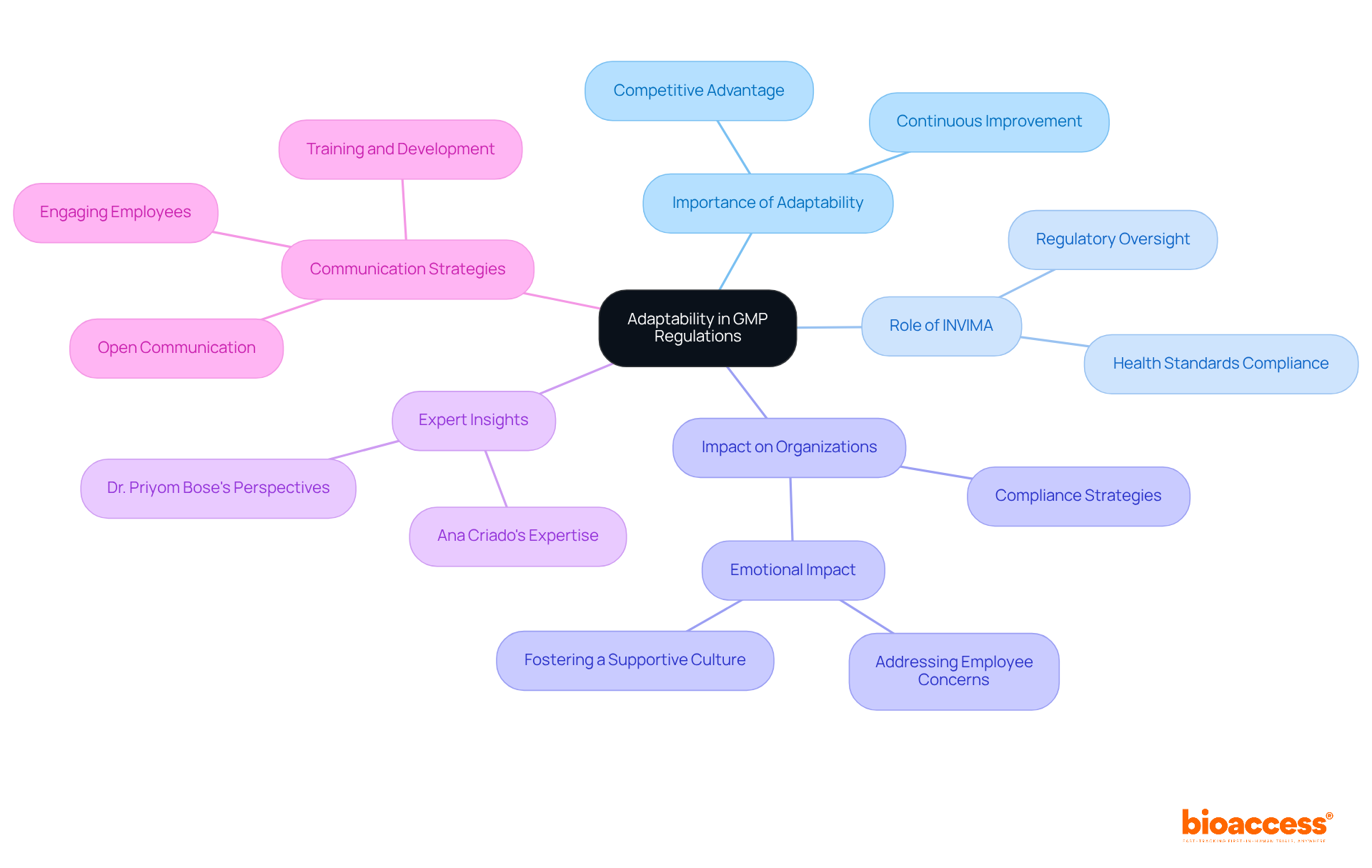
A proactive approach is essential for GMP consultants, as it enables them to anticipate compliance risks before they evolve into major problems. By conducting comprehensive assessments and identifying potential vulnerabilities within manufacturing processes, experts can implement preventive measures that safeguard against non-compliance. This forward-thinking strategy not only shields organizations from regulatory penalties but also boosts overall operational efficiency.
Focusing on risk management allows advisors to help clients uphold a strong regulatory stance, crucial in today’s competitive market. Continuous improvement is vital as industry practices evolve, and a culture of quality focused on ongoing enhancement can help organizations balance immediate results with long-term objectives.
As Charles Eames stated, 'Eventually everything connects - people, ideas, objects. The quality of the connections is the key to quality per se.' By promoting a comprehensive strategy to quality that engages all staff, advisors can facilitate significant enhancements and guarantee lasting adherence.
To further improve adherence, consultants should consider implementing Kaizen principles, which advocate for small, continuous enhancements in processes. This method not only involves all staff but also fosters a culture of quality that is crucial for anticipating and reducing GMP adherence risks.

A collaborative mindset is crucial for enhancing GMP adherence efforts. GMP consultants must engage closely with various stakeholders, such as clients, regulatory bodies, and internal teams, to effectively achieve regulatory goals. By fostering a culture of collaboration, consultants can promote knowledge sharing and collective problem-solving, essential for navigating the complexities of GMP regulations. This collaboration not only yields improved adherence outcomes but also cultivates stronger connections among all parties involved, resulting in more effective and efficient processes.
For instance, organizations with developed competitive intelligence functions experience 31% fewer regulatory delays, underscoring the importance of collaboration in streamlining regulatory efforts. Moreover, successful projects led by GMP consultants often demonstrate how cross-functional teamwork can optimize resource allocation, leading to a 28% increase in resource utilization rates and a 34% reduction in project cancellation rates. As industry experts assert, integrating diverse perspectives through teamwork is a strategic imperative that significantly enhances overall compliance capabilities.
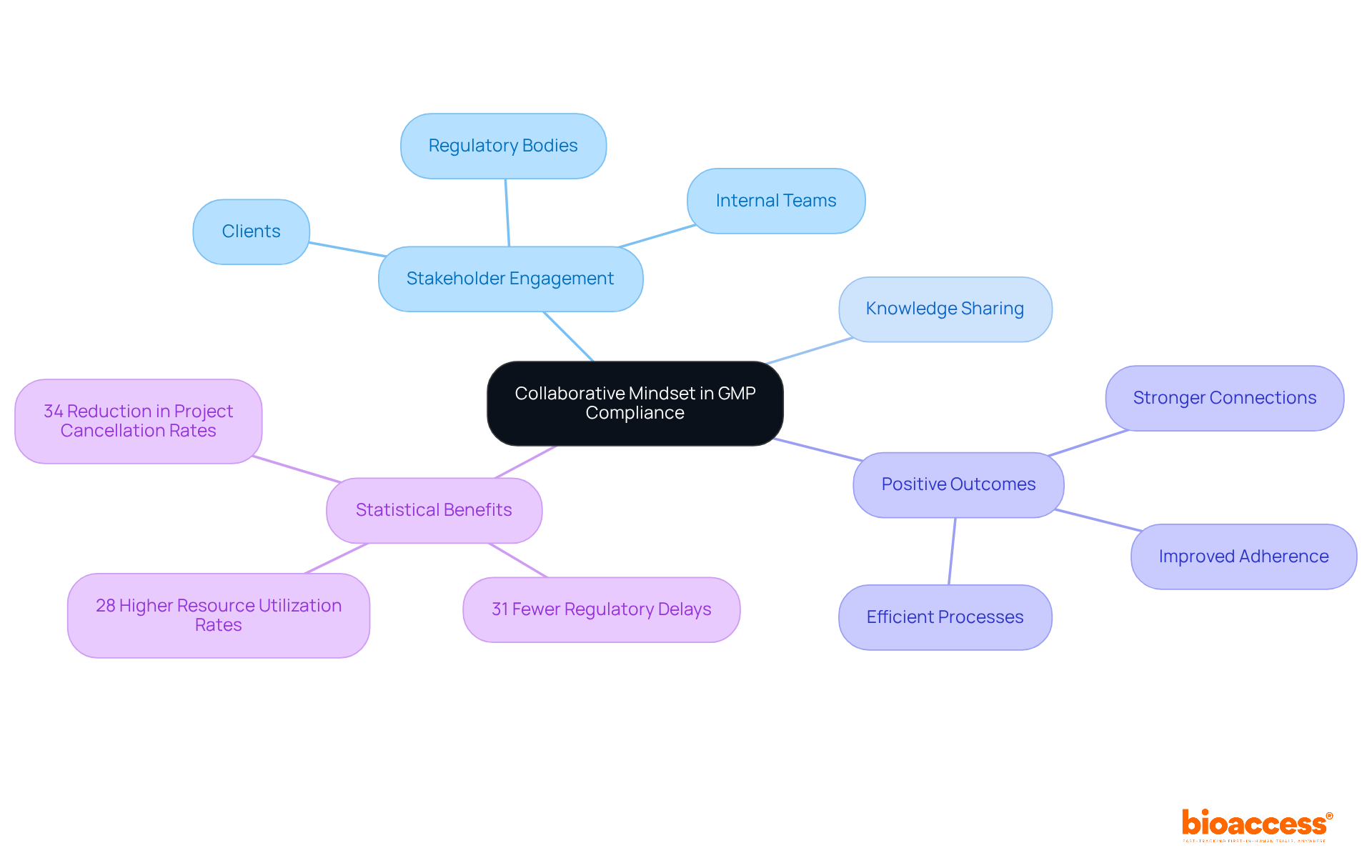
Technical expertise stands as a fundamental quality for GMP specialists, who must possess a profound understanding of pharmaceutical manufacturing processes. This critical knowledge empowers them to provide informed guidance on best practices, equipment validation, and process optimization. By leveraging their technical skills, consultants are positioned to assist organizations in implementing effective quality management systems that align seamlessly with GMP requirements. Such expertise not only enhances adherence but also significantly contributes to the overall quality and safety of pharmaceutical products.

A results-oriented strategy is crucial for achieving success in GMP adherence. GMP consultants must focus on delivering measurable outcomes that align with their clients' objectives, particularly in the area of comprehensive clinical trial management services. This approach encompasses:
By establishing clear goals and diligently monitoring progress, advisors can demonstrate the value of their services and build trust with clients. This emphasis on results not only elevates client satisfaction but also nurtures a culture of accountability within the organization. By prioritizing outcomes, GMP consultants empower clients to navigate the complexities of GMP compliance while successfully reaching their business objectives.
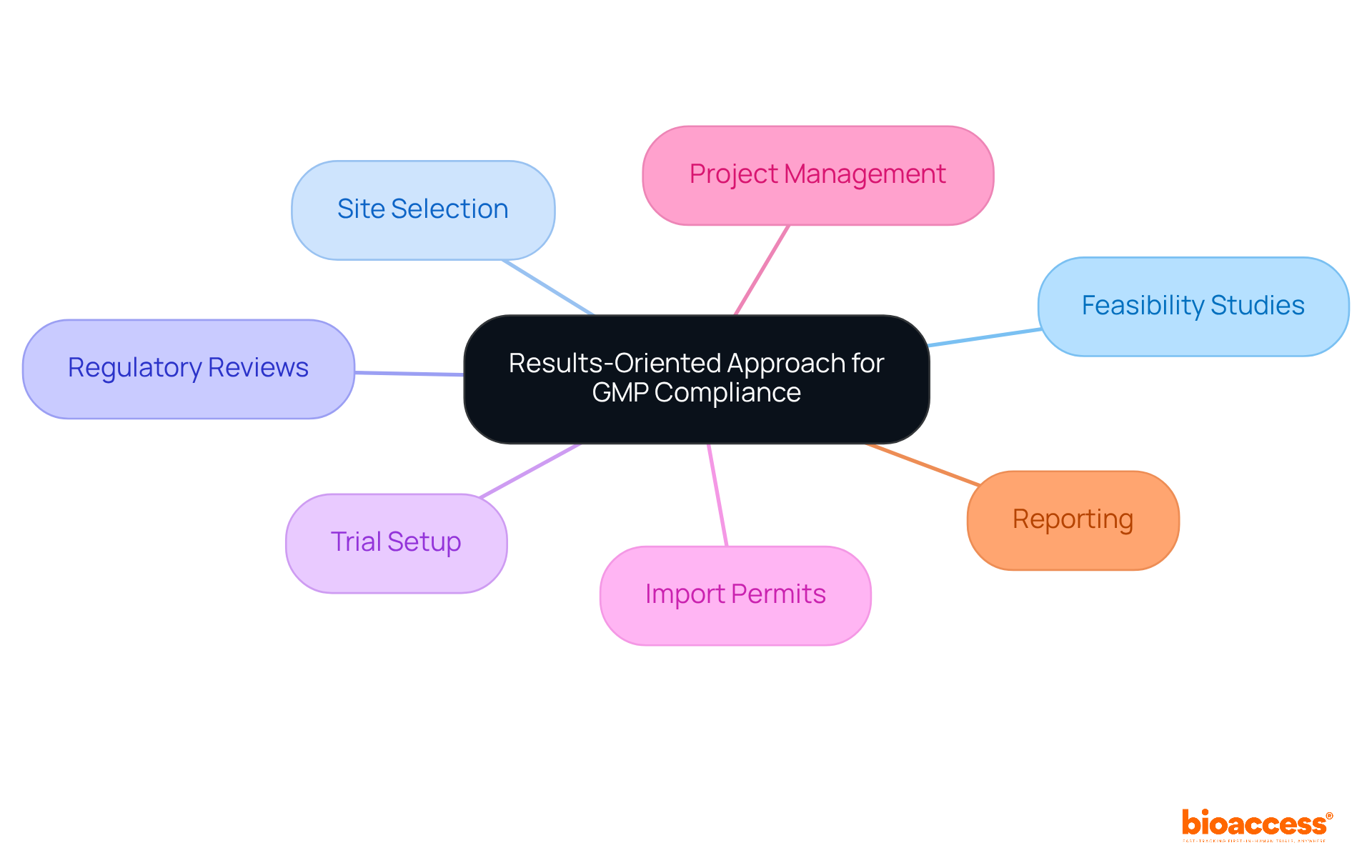
The effectiveness of GMP consultants is fundamentally anchored in a combination of essential qualities that empower them to adeptly navigate the complexities of pharmaceutical compliance. With extensive industry experience, robust communication skills, and a proactive mindset, these experts are pivotal in ensuring that organizations not only meet regulatory requirements but also cultivate a culture of quality and continuous improvement.
Throughout this discussion, key attributes such as problem-solving abilities, adaptability to changing regulations, and technical expertise have emerged as critical for success in GMP consulting. Moreover, the significance of collaboration and a results-oriented approach is paramount, as these elements greatly enhance compliance efforts and drive measurable outcomes for clients.
In a landscape where regulatory standards are in constant flux, the value of effective GMP consultants is undeniable. Organizations must prioritize these qualities when selecting their compliance partners, ensuring they are well-equipped to tackle the challenges posed by the pharmaceutical industry. By embracing these essential traits, companies will not only streamline compliance processes but also bolster the overall success and integrity of pharmaceutical products in the market.
What is bioaccess® and how does it support GMP compliance?
bioaccess® is a company focused on accelerating GMP adherence for pharmaceutical facilities by leveraging its extensive knowledge of legal frameworks in regions such as Latin America, the Balkans, and Australia, with the assistance of GMP consultants.
How quickly can bioaccess® activate pharmaceutical sites?
bioaccess® has a proven track record of activating over 50 sites in less than 8 weeks.
What is the timeframe for securing ethical approvals with bioaccess®?
bioaccess® can secure ethical approvals in just 4-6 weeks.
What services does bioaccess® offer to pharmaceutical companies?
bioaccess® provides end-to-end services, including parallel submissions by GMP consultants, allowing companies to focus on innovation while ensuring compliance with FDA, EMA, and MDR standards.
Why is industry experience important for GMP consultants?
Extensive industry experience is crucial for GMP consultants as it equips them with insights necessary to navigate complex legal requirements, particularly in areas governed by stringent authorities like INVIMA.
What role does INVIMA play in pharmaceutical compliance?
INVIMA, established in 1992 under Colombia's Ministry of Health and Social Protection, oversees the marketing and manufacturing of health products, ensuring adherence to health standards and best practices.
How do GMP consultants help companies with compliance challenges?
GMP consultants knowledgeable about INVIMA's compliance framework can foresee challenges and offer customized solutions, ensuring adherence is a pathway to quality assurance rather than just a checkbox.
What communication skills are essential for effective GMP consulting?
GMP consultants must possess robust communication abilities to clearly convey compliance demands to clients and stakeholders, including producing comprehensive documentation that meets regulatory standards.
How can effective communication impact financial outcomes in GMP processes?
Effective communication can prevent costly out-of-specification results, as demonstrated by AstraZeneca, which saved between $10,000 and $50,000 per prevented result by restoring a test method.
What strategies can GMP experts use to enhance communication?
GMP experts should focus on developing clear communication protocols, utilizing visual aids to convey complex information, and ensuring that all documentation is thorough and accessible.